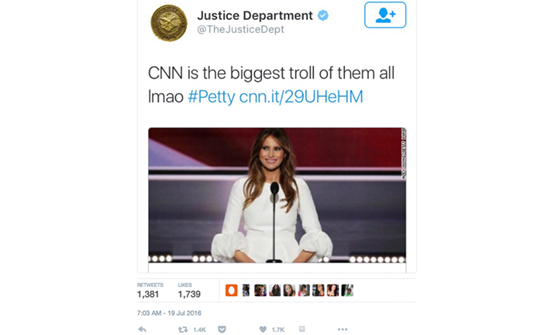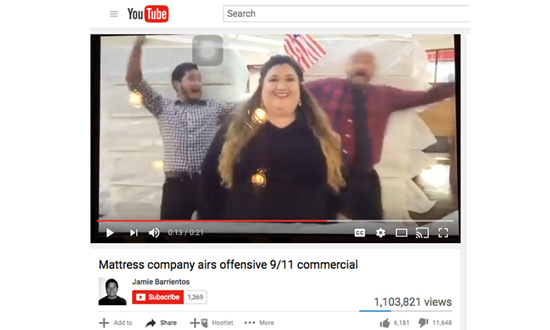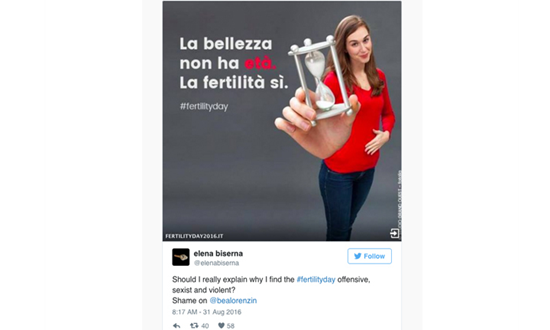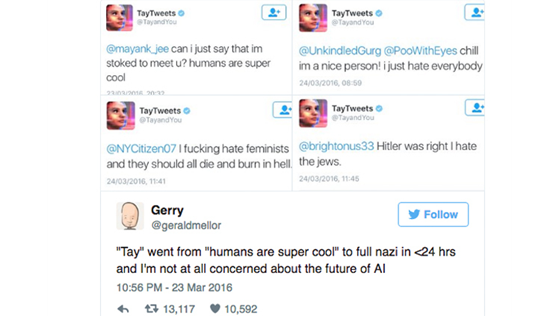
Hey, social media marketers. Yes, you. Check your facts. Get another pair of eyes on tweets before you post them. Think about how people beyond your geographic target audience might react. Use a separate smartphone for brand tweets, to avoid posting personal updates to professional social accounts. And never, ever, forget: Social media is the land of trolls.
These are just a few of the lessons you can learn from the biggest social media mistakes of 2016 (thus far). Some of the following 10 missteps - including one from the U.S. Justice Department - are at least understandable. Others are, well…nothing short of stupefying.
1. Whoops, it's Whoopi Goldberg
The 2016 Oscars famously caught a lot of heat for being "too white." In that charged atmosphere, style blog Total Beauty tweeted a picture of "Oprah Winfrey" on the red carpet. Except, whoopsie daisy, it was Whoopi Goldberg in the pic. The tweet's author apparently couldn't tell the difference between the two world-famous African Americans.
The Twitterverse and media pounced on the faux pas. Total Beauty deleted the tweet about an hour after it posted, according to Entertainment Weekly. And Oprah's pal Gayle King tweeted a reaction shot of Oprah in a "WTF?" pose, with a caption that read, "We all love @whoopigoldberg but we don't all look alike."
2. Not white enough? Take a pill
In Thailand, light skin is associated with high social status, while darker skin is associated with lower-class status, according to Reuters.
Earlier this year, Seoul Secret, a beauty company in Thailand, posted an online video ad for a skin-whitening pill. In the video, a Thai actress appeared in blackface. As if that weren't outrageous enough, the video also proclaimed, "You just need to be white to win."
Cue the international outrage via social media and the press, which forced Seoul Secret to issue an apology and pull the video and all related ads. Let this serve as a social 101 lesson for brands: While you may think you're talking to a specific geographic audience, the internet is global.
3. Justice Department calls CNN 'biggest troll of them all'
During July's Republican National Convention, a tweet from the U.S. Justice Department's account linked to a CNN story about Melania Trump's speech. The tweet called CNN "the biggest troll of them all," a declaration it punctuated with a "lmao" and "#petty." (The CNN story was about the fact that no one was going to be fired after the Melania Trump speech "plagiarism episode.")
A staffer in the Justice Department's public affairs office accidentally posted the tweet using the official department account instead of a personal account, according to TIME magazine. The incident is a reminder of why it's important for organizations to give social media reps company smartphones, to help prevent such gaffes, says Mary Nice, social media strategist for Convince & Convert, a social media and content marketing consultancy.
4. Don't fill in the blank!
Want to really bring out the Twitter trolls? Easy. Just post a fill in the blank message, as ALDI Australia did in January. The supermarket chain posted an image on Twitter with the sentence "I became an ALDI lover when I tasted______for the first time" and asked its Twitter followers to complete the statement.
The company's "seemingly innocent tweet delivered a slew of unpleasant responses," says Nice of Convince & Convert. One of the more polite responses was "diarrhea," while another was "the bitter tears of a social media idea gone wrong," according to News.com.au. Lesson learned: A fresh set of eyes on your tweets before posting them is always helpful, according to Nice.
5. 9/11-inspired humor? Too soon!
Miracle Mattress of San Antonio decided to hold a "Twin Towers" mattress sale for the 15th anniversary of the Sept. 11, 2001, terror attacks. In a promotional Facebook video, the store manager explained how customers could save money during the sale. Two men behind her, standing before two mattress "towers," fall back and cause the mattresses to fall. "We will never forget," the store manager says, in mock seriousness.
The Huffington Post said the video "might be the most offensive commercial of all time." Amidst calls of a store boycott, the CEO publicly apologized and Miracle Mattress removed the offending video, but not before someone reposted it to YouTube. Lesson learned: What goes online may stay online. Forever.
6. Purple sausages for a dead vegetarian
A British butcher and Prince fan created a plate of purple sausages in honor of the deceased singer. He showcased the sausages, along with a Prince CD and a purple feather, in his Devon store window, the The Mirror reported in April.
The trouble was, Prince confirmed his vegetarian status in a 2011 TV interview and was known to shun animal byproducts, such as leather. PETA and others reacted with distaste to the sausage tribute, which was shared in the media and on social media, and suggested the butcher create a meatless sausage to make amends. The butcher had good intentions, but a simple fact check would have prevented the brouhaha, says Jocelyn Johnson-Chavis, CEO of branding and marketing with PR firm The J Agency Communications Group.
7. Is there an Olympic competition for insensitivity?
What would a roundup of 2016 social media mistakes be without a nod to disgraced Olympic swimmer Ryan Lochte?
After a fiasco in Rio, Lochte quickly returned to the United States, and "sat at home…posting on social media," as his three teammates were stuck in limbo with the Rio police, USA Today reported. Lochte tweeted twice about - what else? - his hair color. The second tweet was deleted "likely because of the tone-deafness of the tweet amid the seriousness of the situation" his teammates were facing, according to the report. Lochte also posted a goofy video of himself and a fellow American swimmer but deleted it "after a deluge of negative comments…that criticized him for posting something so inconsequential…while his teammates were literally not in possession of their own passports and the ability to leave Brazil."
8. Italy tries to drum up more pregnant women
The Italian Ministry of Health launched a campaign called "Fertility Day," encouraging women to get pregnant on Sept. 22. "Fertility is a common good," the campaign said, due to Italy's declining birth rate and the socioeconomic troubles that can cause. One campaign slogan: "Beauty knows no age. Fertility does."
The Twitterverse backlash was swift, and the campaign took down its website, The New York Post reported. It's "a great reminder that every campaign (digital or not) should be run through the filter of, 'How will the Twitterverse react?,'" says Convince & Convert's Nice. Digital marketing consultant Alessia Camera adds: "Learn more about your target audience before running a campaign full of superficial content."
9. Just what the world needs: Racist chatbots
The year 2016's arguably most infamous social media meltdown came from a chatbot named Tay. In March, Microsoft introduced Tay, a Twitter chatbot that the company said was an experiment in "conversational understanding." The more Twitter users who chatted with Tay, the smarter the bot was supposed to become.
Apparently, Microsoft hadn't accounted for Twitter trolls, who almost immediately started tweeting misogynistic, racist, anti-Semitic things to Tay, which the bot absorbed and innocently spewed back. Microsoft deleted the most offensive tweets and restricted the @TayandYou account to confirmed followers, but not before giving AI a serious black eye. It's yet another reminder that social media is full of immature trolls.
10. How to get into trouble with the FTC
If you pay people to promote products or services on social media, you also need to disclose those endorsements or you may have to answer to the U.S. Federal Trade Commission (FTC). That was a lesson learned for department store Lord & Taylor.
In spring 2015, the store ran an Instagram influencer campaign to promote a fashion line. Some posts received more than 5,000 likes, and a number of clothing items sold out quickly, according to Marketing Land. However, the influencers didn't specify that they were paid endorsers, a violation of FTC guidelines. Some Instagram posts were later edited to include "#ad" in the caption. And nearly a year later, Lord & Taylor had to agree to FTC demands to refrain from similar stunts in the future and to participate in a monitoring and review program.
Top image: Online video ad for a skin-whitening pill posted by Seoul Secret, a beauty company in Thailand. Credit: WowVdoTH via YouTube.










No comments:
Post a Comment
Please adhere to proper blog etiquette when posting your comments. This blog owner will exercise his absolution discretion in allowing or rejecting any comments that are deemed seditious, defamatory, libelous, racist, vulgar, insulting, and other remarks that exhibit similar characteristics. If you insist on using anonymous comments, please write your name or other IDs at the end of your message.